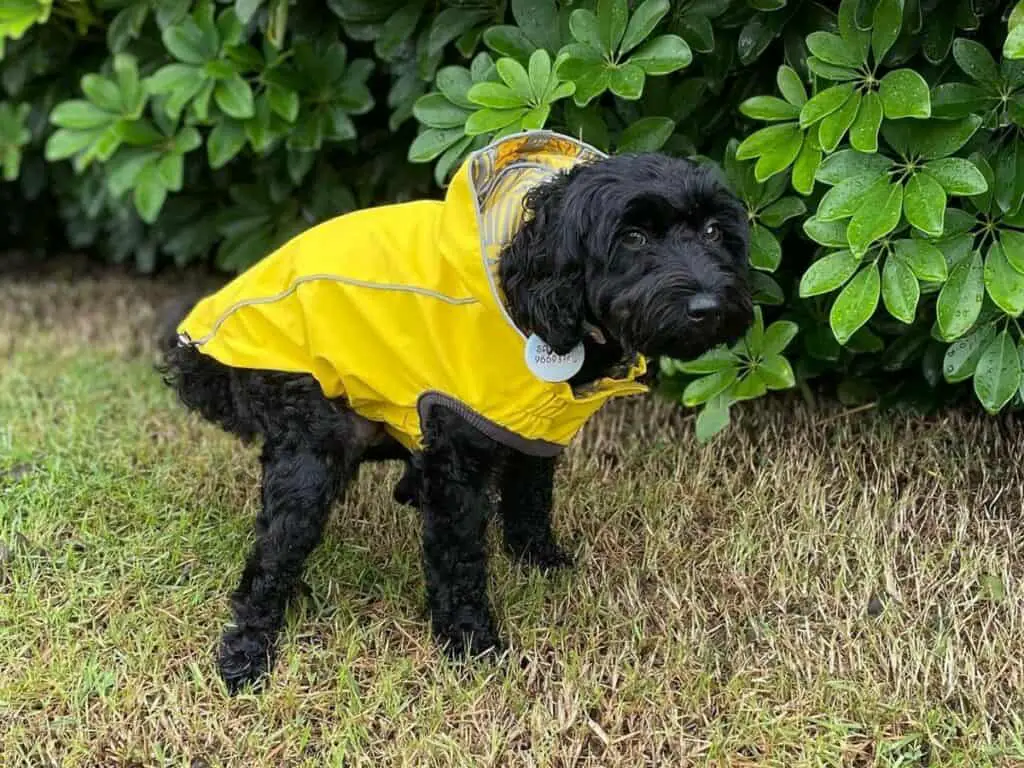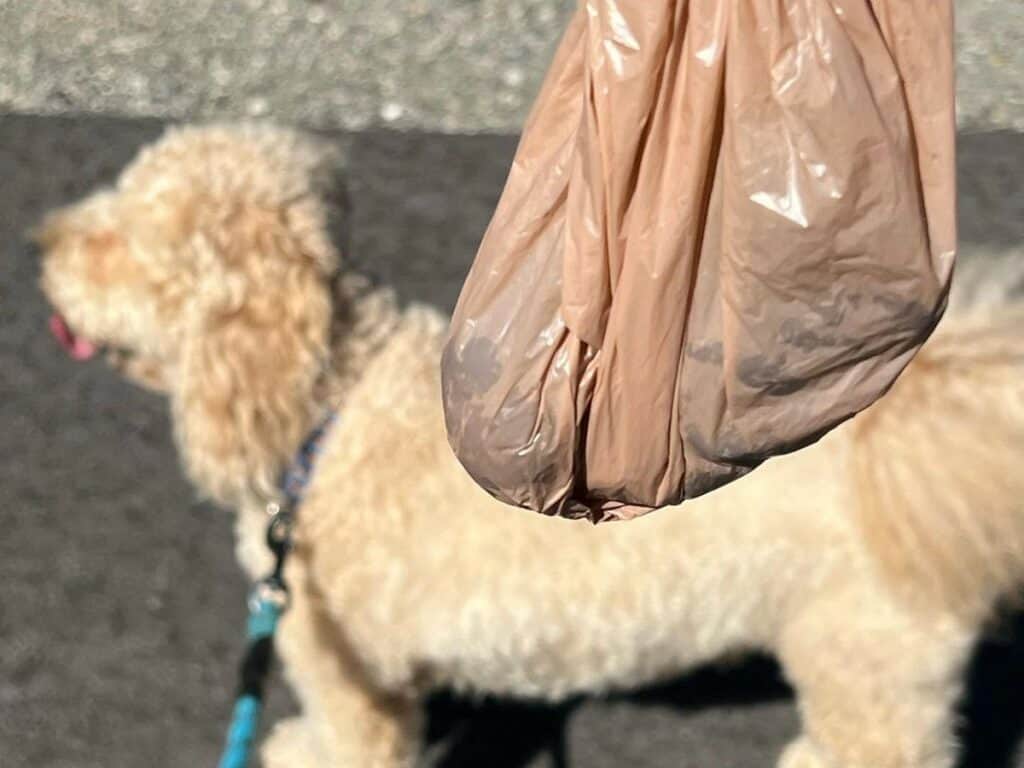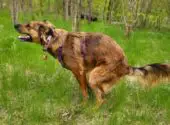So you see some white specks in dog poop. What now?
Don’t freak out. It’s not necessarily a bad sign, and it always happens. But that doesn’t mean you should ignore them entirely.
If the white specks in dog stool are due to undigested food or medication, you don’t need to do anything. But if they appear to be moving, it could mean that your dog has a parasite, and you should take action.

Identifying the Causes of White Specks in Dog Poop
Are you wondering what white specks in your dog’s poop might mean? The answer is likely that your dog has eaten something unsuitable for them. Here are some of the most common reasons white specks (not moving) appear in dog poop.
Undigested Food
Bones: Some bones may pass undigested through your dog’s digestive tract if you feed them a raw diet or allow them to chew on bones. These undigested bones then appear in your dog’s feces as white specks.
If you have observed the feces for a while and the white specks appear not moving, there is likely no cause for concern. You can also retrace your dog’s meals to see if they’ve eaten anything they shouldn’t have. Did they scarf down that chicken bone? Looks like you may be dealing with an undigested bone in their stool.
Rice and Grains: Are you seeing white specks in your dog’s poop? If they’re having trouble digesting rice or grains, this could be the reason why!
Rice or grains are meant for human consumption, and it’s no wonder your pooch is having trouble digesting them. They pass through his digestive tract without being properly digested, leaving white chunks behind.
If a dog has diarrhea, it is common for them to pass food like rice and grains through quickly without digesting it fully.
The same evaluation method for undigested bones should be used for undigested rice. This includes asking yourself if the specks are moving and if your dog has recently eaten rice.
Seeds and Nuts: Just like us humans, some foods don’t agree with our furry friends. Seeds and nuts (e.g. almonds, sesame seeds, corn) can give them some tummy trouble and appear as white specks in their feces.
No cause for alarm with these white specks, although you should always keep tabs on your pet outside to ensure they’re not scavenging around.
Undigested Capsules
It is important to be mindful that the hard casing of pills can be difficult for dogs to break down if they have recently ingested any medication in pill form. As a result, you might see some white specks in dog poop that look like white rice.
Don’t be alarmed if you see a white spot in your dog’s stool after they start taking medication — this is actually pretty common among older and senior dogs.
If you are unsure of what you are seeing, it is best to consult with your vet. They can help you figure out what’s going on with your dog.
Dog Food or Treat Traces
Seeing unmoving white specks in dog poop could be because they’re eating food with small traces of bone in it.
Although most dog foods are of excellent quality, it is important to know that even the most expensive brands unavoidably contain small amounts of bone or tissue that may cause white specks in dog poop. While this may be concerning to hear as a dog owner, the good news is that it does not affect your dog’s health.
Chew Toy Pieces
Some popular dog chew toys, like everyone’s favorite Nylabone, create tiny little plastic shavings from all that chewing. When ingested, these shavings show up in their poop as white specks.
If your dog’s a chewer, they might go for other plastic objects over their usual toys. We’ve heard of a case where the white specks in a dog’s poop were actually from the handle of a white toothbrush that the pup had found and chewed. Imagine that!
If the White Specks in Dog Poop are Moving, What Could Be the Cause?
Your dog’s stool can provide valuable insights into its health. Moving white specks in dog poop can indicate a serious parasite infestation.
Fly Larvae
Those white specks in dog poop could be fly larvae deposited there by a fly after your dog passed it.
This is good news for dog owners: it means there’s nothing wrong with your pup. However, If you have fly eggs and larvae around your house, your environment is contaminated and could affect your health and your dog’s. The best way to mitigate this problem is to ensure you clean up after your pet promptly.

Tapeworm
It’s not just an itch — if your dog is scooting their butt along the ground or carpet, she could have a tapeworm.
Dogs can get tapeworms from swallowing infected fleas while they’re grooming themselves. Ingested tapeworms find their way into your dog’s system and mature into adult worms that feast on their partially digested food.
Also, your dog could easily contract a tapeworm if they come into contact with the feces of another infected animal.
Furthermore, tapeworms are really sneaky little parasites. Your dog can be infected with them and go undetected for a long time. The only way to tell if your dog has a tapeworm is by looking for proglottids containing tapeworm eggs. When proglottids are passed through poop, the tapeworm eggs are released into the surrounding environment, where they will hatch and infect other animals.
The best way to get rid of tapeworms is to take your dog to the vet and have them prescribed a medication called praziquantel. Praziquantel is an oral or injectable medication that causes the tapeworm to dissolve in the intestine. There are no significant side effects from taking this medication, and it is highly effective at getting rid of tapeworms.
Roundworm
Puppies are especially vulnerable to roundworms because their digestive tracts are still developing, and their immune systems are not as strong as they will be later in life.
If the mother dog has had the roundworm, there’s a chance her pups could end up with it too. The larvae remain in her body, dormant or encysted, and get passed down to her offspring.
In addition, sniffing, licking and eating infected poop is the surefire way dogs pick up some roundworms.
The roundworm’s larvae live in the intestines of dogs and humans, and as they grow, they feed on partially digested food. Eventually, they reach adulthood and lay eggs.
If your dog has roundworms, it may excrete white or light brown spaghetti-like worms in its feces. Symptoms of roundworm infection include vomiting, abdominal pain, and diarrhea. Roundworms can cause a weakened immune system and lead to extreme weight loss in dogs.
Treatment for roundworms is typically very effective. Be sure to bring a stool sample to the appointment, as this will help the vet confirm the diagnosis.
Hookworm
If you have a dog, it’s important to be aware of the fact that they can get hookworms. Hookworms are parasites that take nourishment from their host’s blood, unlike roundworms that feed on partially digested food in the intestine.
How do you get hookworms? Well, generally speaking, hookworms can be transmitted in a number of ways! They can come orally, through the skin, and from the mother to the puppy before birth.
An infected dog can excrete hundreds of microscopic eggs in its feces, contaminating the surrounding environment. So make sure to pick up your dog’s poop for the sake of public health.
Additionally, dogs can pick up hookworms by sniffing around in infected soil or poop or by licking themselves after walking in a contaminated area. The larvae then burrow through the dog’s skin.
Hookworms are a real pain — quite literally! It is not uncommon for them to be transmitted between dogs and humans, and the larvae can often mature into adult hookworms inside humans, causing extreme skin itchiness.
The primary indicators of hookworm in dogs are coughing, stunted growth, dull and dry coat, bloody diarrhea, abdominal pain, and blood loss.
Read also: What Jelly Mucus In Dog Poop Might Mean?
The loss of blood is a worrying symptom of hookworm. These worms attach themselves to the dog’s intestine lining and inject substances that prevent coagulation into the tissue in order to feed. As a result, your dog is at risk for blood loss and anemia because its blood isn’t clotting properly. Signs of anemia include weakness and fatigue, so be sure to monitor your dog closely.
Heartworm medication doesn’t just protect against heartworms; it also protects against hookworms. But you need to consult a vet to see the best course of treatment for your dog.
Nonetheless, there are several measures that can be taken to reduce your dog’s risk of becoming infected, such as maintaining cleanliness in their surroundings and avoiding exposure to contaminated areas.
What Should You Do If You Find White Specks in Dog Poop?
If you notice your dog’s poop changes in appearance, it’s important to get to the bottom of the issue as soon as possible. White specks in dog stool can be a sign of many different things, and if left untreated, they can lead to serious complications down the line.
If you think the undigested bones are the culprit for white specks in dog poop, it may be time to consider switching your dog’s food to a higher-quality brand. We recommend talking to your vet about the best options or doing your own research on reliable pet food brands.
Read also: 12 Worst Dog Food Brands To Avoid This Year
Likewise, if you think your pup has accessed potentially dangerous substances in your home, it’s best to work on doggy-proofing your home. Some changes you might consider making for your pup’s benefit include removing any trash cans they can reach and switching to toys they cannot destroy.
Be sure to monitor for any vomiting or abdominal pain, as consuming non-food items can result in intestinal obstruction.
Finally, if the white specks in dog poop are due to worms, we always recommend seeing your veterinarian for treatment options.
Related Questions
What are white specks in dog poop?
If there are white specks in dog poop, it could be due to the presence of undigested food, undigested capsules, dog food/treat trace, chew toy pieces, fly eggs, tapeworm, roundworm, and hookworm.
Can you see parasite eggs in dog poop?
Roundworms may resemble spaghetti and can measure several inches in length. Tapeworms, on the other hand, look like rice grains.
Can dogs eliminate worms on their own?
Dogs cannot rid themselves of worms, and the infection can cause serious health problems. Contact your veterinarian immediately if you believe your dog may have worm infection.
References
Lawson, J. R., & Gemmell, M. A. (1985). The potential role of blowflies in the transmission of taeniid tapeworm eggs. Parasitology, 91(1), 129-143.
Moorhead, A. (2021). Roundworms in dogs.
Tüzer, E., Bilgin, Z., Oter, K., Erçin, S., & Tinar, R. (2010). Efficacy of praziquantel injectable solution against feline and canine tapeworms. Turkiye Parazitolojii Dergisi, 34(1), 17-20.




